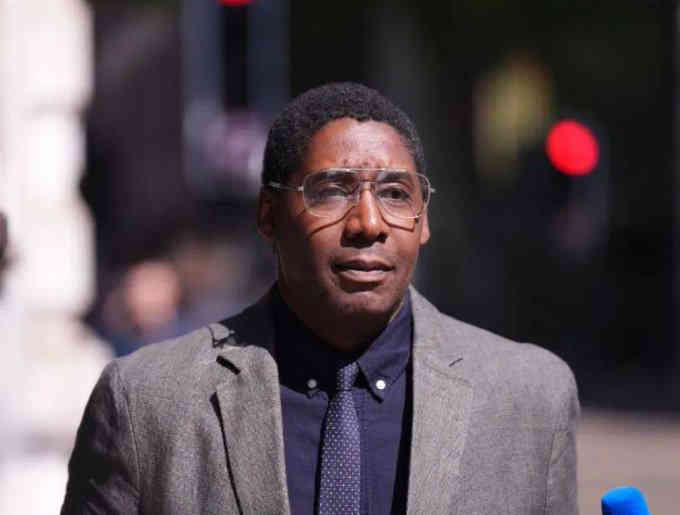British-Nigerian Art Dealer Ochuko Ojiri Pleads Guilty in UK Terrorism Financing Case
- Advertisement -
A British-Nigerian art dealer and former BBC contributor, Oghenochuko “Ochuko” Ojiri, has pleaded guilty to eight counts under the UK Terrorism Act 2000, marking a landmark case in the country’s legal history.
Ojiri, 53, who gained public recognition as a freelance art expert on BBC programmes such as Bargain Hunt, admitted to failing to disclose suspicious transactions involving a sanctioned Lebanese national accused of financing the militant group Hezbollah.
- Advertisement -
First Terrorism Financing Prosecution Involving Art Sales
The case, described by legal analysts as the first of its kind in the United Kingdom, centers on Ojiri’s business dealings between October 2020 and December 2021. During this period, Ochuko Ojiri allegedly sold artwork valued at £140,000 to Nazem Ahmad, an individual sanctioned by the United States in 2019 and later by the UK government in 2023 for alleged links to the Iran-backed Hezbollah organisation.
At a hearing at Westminster Magistrates’ Court, the prosecution led by Lyndon Harris stated that Ojiri’s gallery—previously known as Ramp Gallery, now trading as Ojiri Gallery—knowingly failed to report the high-value transactions, despite being aware of the buyer’s sanction status.
- Advertisement -
“Widespread Knowledge of Links to Terrorism” – Prosecutors Say
According to court testimony, Ojiri was aware of the concerns surrounding Ahmad’s ties to Hezbollah. Harris told the court, “There is one discussion where Ojiri is party to a conversation where it is apparent a lot of people have known for years about [Ahmad’s] terrorism links.”
The court also heard that Ojiri’s gallery engaged external compliance advisors, but “the advice was not properly acted on,” leaving the business exposed to legal violations under the Terrorism Act.
- Advertisement -
Ojiri’s Role and Response
Ojiri was reported to have personally managed communications and sales negotiations with Ahmad, going as far as congratulating the sanctioned buyer on completed purchases.
Also Read : Tinubu Appoints Akpabio, Nwuche, Akinola, 3 Others into Key Positions
The UK government had earlier revealed that Nazem Ahmad held an extensive art collection in the United Kingdom and had ongoing dealings with local artists, galleries, and auction houses. Despite existing sanctions, these activities allegedly continued without proper disclosure or oversight.
BBC Responds, Distances Itself from Former Contributor
- Advertisement -
Ojiri, who previously featured as an expert on Bargain Hunt, is not a BBC employee, and the broadcaster clarified that he has not appeared in any of its programmes since 2023.
In a statement, a BBC spokesperson said, “It would not be appropriate to comment on ongoing legal proceedings.”
Legal Proceedings and Upcoming Sentencing
Ojiri was granted conditional bail by District Judge Briony Clarke, who also ordered him to surrender his passport to prevent potential flight. His lawyer, Gavin Irwin, emphasized that Ojiri is not considered a flight risk.
The case was the result of joint investigations by the Metropolitan Police’s specialist Arts and Antiques Unit, the Office of Financial Sanctions Implementation (OFSI), and HM Revenue and Customs (HMRC).
Sentencing Date
Ojiri is expected to be sentenced on June 6, 2025, at The Old Bailey, the Central Criminal Court of England and Wales.
Background: Who Is Nazem Ahmad?
- Sanctioned by the U.S. Treasury in 2019 for allegedly funding Hezbollah.
- Later blacklisted by the UK government in 2023 under its updated sanctions regime.
- Accused of using high-value art purchases to circumvent international sanctions and conceal financial activity linked to terrorist financing.
About Hezbollah
Hezbollah is a Shia Islamist political and militant group based in Lebanon. The organisation is classified as a terrorist group by both the UK and the United States, among others, due to its militant activities and alleged ties to Iran.
Implications and Expert Analysis
This case serves as a legal milestone in the fight against terrorism financing within the UK’s luxury goods and art sectors. Experts believe it may lead to stricter regulatory oversight of high-value art transactions and increased pressure on galleries and dealers to conduct due diligence and report suspicious financial activity.
- Advertisement -


